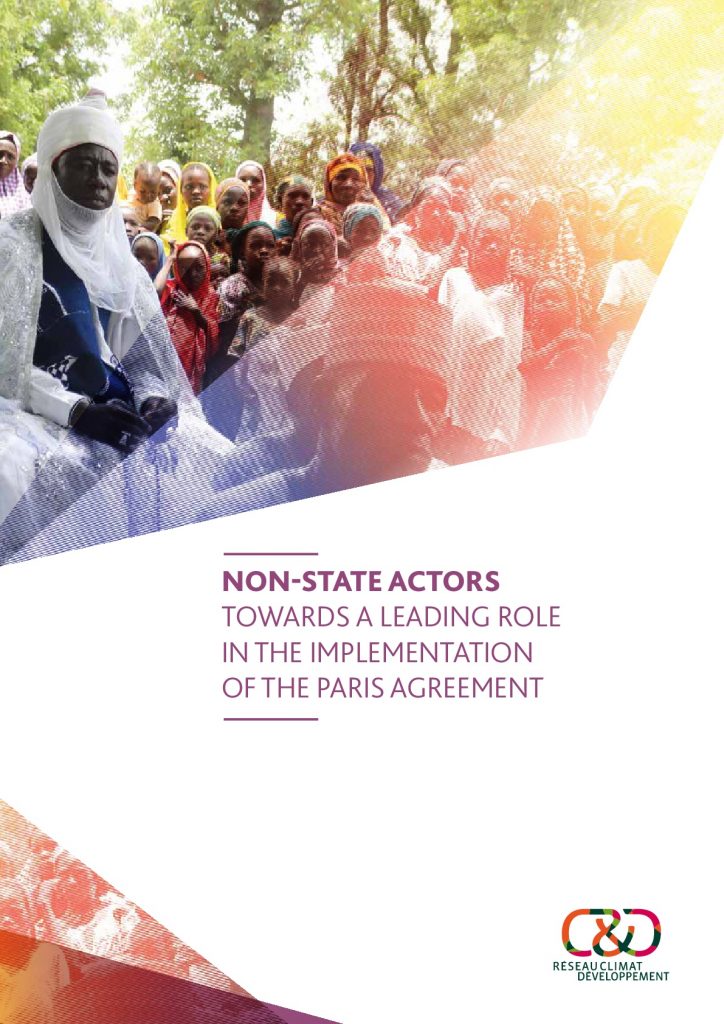Presentation
The 2015 Paris agreement marks an essential starting point to halt the climate crisis. However, everything remains to be done once it is adopted. Indeed, the priority is now to negotiate implementation mechanisms that have not been defined and agreed upon during COP21, and to work on reaching the agreement’s objectives. It must also be ensured that countries’ Nationally Determined Contributions (NDC) really contribute to the reinforcement of the fight against climate change; and are increased to address the priorities of the poorest and most vulnerable of all countries.
The overwhelming majority of African states have submitted their INDC (Intended Nationally Determined Contributions) before COP21: revision,
improvement and implementation processes are currently underway. The involvement of all the actors on the local, national and international levels is required for a proper implementation of these INDC. From then on, non-state actors –including first and foremost NGOs, associations and local authorities taken into account in this study– must be a driving force in these processes. Through their involvement in the various dynamics existing at distinct levels, they have the potential to make the implementation of the Paris agreement not only more effective but also more ambitious.
However, non-state actors face multiple institutional barriers that make access to decision-making and funding bodies more difficult; while they are necessary to enhance and sustain the experience of non-state actors. With little or no access to information, these actors do not always have the means to efficiently follow up with the processes. It is therefore important to reinforce their technical skills on climate change, but also to enhance synergies that could emerge between them. Low appropriation of international, national and local initiatives can sometimes result from these
barriers. In turn, they risk fostering the disengagement of non-state actors and limiting the impact of these different processes.
Fortunately, there are numerous levers that can mitigate these obstacles and lead to an inclusive implementation of the Paris agreement. Inspiring examples abound to mobilize and include non-state actors.
Some examples of action
In Benin, the inter-village gathering of the Collines region (Groupement Intercommunal des Collines, GIC) plays host of a pioneering experience where NGOs, local authorities, beneficiary populations and national and international experts work hand in hand to face climate change. This is thanks to the willingness of the local authorities to bring together different non-state actors at the local level.
In Togo, the definition of the INDC resulted from a participatory and inclusive process involving not only relevant Ministries and industry leaders, but also civil society organisations. This approach engaged by the Togolese state through the Ministry of Environment and Forest Resources (Ministère de l’Environnement et des Ressources Forestières, MERF) enabled non-state actors to contribute to the process and better took into account their experience.
In Morocco, the “4C Maroc” initiative is an example of trans-sector coordination to fight climate change. Its innovative governance mode brings together state actors, the private sector, research bodies and civil society organisations. This initiative, although in its early stages, is rich in solutions enabling to integrate non-state actors in the development of climate policies.
The diversity and efficiency of the projects presented in this report show that numerous national and local initiatives exist, using innovative tools and approaches. It is therefore necessary to rethink the interactions between the different levels of action by sharing practices and information to all the spheres of climate action, at all levels. This must take the shape of (1) a reinforcement of non-state actors contribution in all the discussion forums at the international level; (2) a reinforcement of the involvement of non-state actors in the implementation of climate processes at the national level; and (3) a better cooperation between local political actors and non-state actors for the implementation of adapted climate and local development plans.


